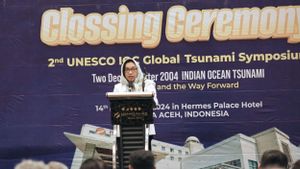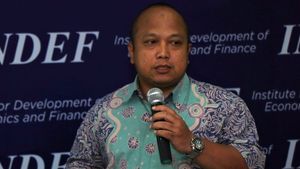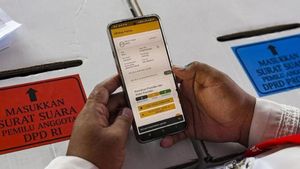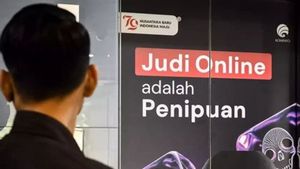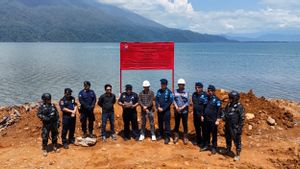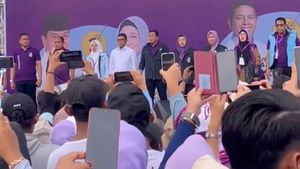JAKARTA - Commission IX will listen to the aspirations of all levels of society regarding the Draft Health Law (RUU) made using the Omnibus Law method. This follows the rejection of a number of professional organizations (OP) for health workers (nakes), including the Indonesian Doctors Association (IDI).
Deputy Chairman of Commission IX of the DPR, Emanuel Melkiades Laka Lena, said that the Health Bill is expected to be present to break health service reforms in the country. To health workers who demonstrate, he also reminded that the Health Bill is still in the process of being discussed.
"We are still hearing the discussion and public opinion until now. We also ensure that all aspirations will be accommodated properly," said Melki, Tuesday, June 6.
As is known, the rejection of the Health Bill by a number of OPs is caused by a number of things. The health workers who reject the bill consider that criminalization will occur if the Health Bill is ratified because there is an disappearance of elements of lex specialis in the Professional Law where this bill revokes the law (UU) regarding doctors, the law on dentists, the Law on nurses, and the Law on midwives, the Law on health workers, the Law on hospitals.
In the Health Bill, OP's authority is also no longer single. The lost OP authority is related to the provision of recommendations to obtain a practice permit. There is also a conflict regarding articles related to tobacco and alcohol.
The masses who held demonstrations related to the Health Bill came from 5 OP namely IDI, the Indonesian National Nurses Association (PPNI), the Indonesian Midwives Association (IBI), the Indonesian Pharmacists Association (IAI), and the Indonesian Dental Association (PDGI).
Melki ensured that the discussion room process was still open to receiving input from various relevant OPs and stakeholders.
"Input from OP, hospitals, health centers, academics, health workers everywhere. And also of course our patients also listen to their complaints, we accommodate everything so that it can be formulated in this Health Bill so that it becomes an offering as an independence anniversary this time," said Melki.
Commission IX together with the Government are said to always discuss with related parties in the discussion of the Health Bill. According to Melki, input from various elements is also included in the substance of the bill.
"Because actually in various meetings that have been held so far, input has been heard from friends at the OP and has become the formulation of the DPR RI," he said.
Melki added that since the preparation of the Health Bill in the Legislation Body (Baleg), the DPR has involved all parties, including the leaders of the OP Health Workers.
"Of course there is also from IDI. The public hearing of the government has also been, when entering the discussion stage at the IX commission, 2 public consultations have been invited with other parties as well as to the faction or members of the Panja," said Melki.
Commission IX of the DPR RI realizes that not all input can be fulfilled because there are many interests that must be accommodated. Even so, Melki said there were many health practitioners who supported the birth of the Omnibus Law Health Bill for the greater good.
"Many personal medical personnel and health workers support the discussion of the Health Bill to be continued until it is completed according to the aspirations of many parties," he said.
"Until now, the discussion has been open to hearing input from all OPs and communication with OP has gone well with the members of the committee," added Melki.
The legislator from the East Nusa Tenggara (NTT) II electoral district also emphasized that the issue of criminalization related to the health worker profession did not occur in the formulation of the Health Bill. Even in the Health Bill, said Melki, OP is given the mandate to solve criminal problems through internal channels before being brought to the realm of law.
"Regarding the records of OP friends for liberalization matters, we also really take care of it so that the nationalism of health independence continues. We also ensure that we protect the criminalization articles related to criminalization of health workers and medical personnel so that they do not occur," he explained.
Regarding the issue of the large number of foreign health workers and health products from abroad which are claimed to be accommodated through the Health Bill, Melki said it was not true. Because there will be various certain and special requirements regarding this matter.
"Then there are also issues related to how we ensure that health workers in Indonesia become hosts. Therefore, we will strengthen it," said Melki.
On the other hand, Commission IX of the House of Representatives in charge of health affairs hopes that every input in the Health Bill comes with the spirit to build better health services. That way, according to Melki, this regulation will break health service reforms in Indonesia.
"Most of what we discussed is how to improve big issues about health that we need to improve. So that health workers in the country are of higher quality, more equitable, and can reach as many people as possible with adequate quality to the end of the country," he said.
To note, the Omnibus Law Health Bill will change the paradigm of health policies by prioritizing the prevention of the public from falling ill through promotive and preventive strengthening.
In addition, the Health Bill regulates that the quality of hospital services can be improved, the domestic medical equipment and pharmaceutical industry can be more advanced. The goal is to be able to create many jobs and make drug prices cheaper.
Furthermore, the Health Bill will encourage genetic-based research, so that Indonesia can produce sophisticated and precise drugs and provide a legal basis for telemedicine services that have not yet been regulated.
The Health Bill, which is the Government's initiative, is also expected to improve the crisis of specialist doctors so that the adequacy of specialist doctors and doctors throughout Indonesia can be achieved in the next 5 years. Without this bill, it is predicted that the adequacy of specialist doctors will only be achieved in the next 30 years.
Melki also hopes that OP, who rejects the Health Bill, is willing to open a discussion room so that there will be a middle ground of every problem. Moreover, the debated polemic is only a small part of the text content of the Health Bill.
Commission IX of the DPR hopes that the rejection action will not end with the threat of a national strike as stated by the 5 OP of health workers. The threat of a strike is considered to disrupt the health service process.
"Nakes are professions that have a noble duty in providing health services to all Indonesian people. Distributing aspirations is a right, but do not forget the responsibility so that public health services become disrupted," said Melki.
"Because most of the Health Bill is directly related to improving health workers, which means for the benefit of the wider community," he concluded.
The English, Chinese, Japanese, Arabic, and French versions are automatically generated by the AI. So there may still be inaccuracies in translating, please always see Indonesian as our main language. (system supported by DigitalSiber.id)






